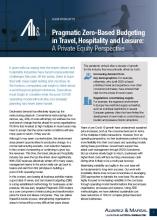Pragmatic Zero-Based Budgeting in Travel, Hospitality and Leisure: A Private Equity Perspective
It goes without saying that the travel, leisure and hospitality industries have faced unprecedented challenges this year. All the same, there is hope that with mass rapid testing and vaccines on the horizon, companies can begin to think about a world beyond global lockdowns. Executives must begin to consider what the post-COVID operating model will look like, but strategic planning has never been harder.
Decimated demand has effectively ripped up the restructuring playbook. Conventional restructurings that remove, say, 30% of costs will simply not address the root-and-branch change that lies ahead for some organisations. PE firms that invested at high multiples in recent years may have to accept that the same market conditions will take many years to return, if they ever do.
Although it may seem counterintuitive, this environment does present opportunities for productive change. In a normal restructuring scenario, cost reduction happens in the context of preserving or continuing to grow topline revenues. This time, the travel, leisure and hospitality industry has seen the top line driven down significantly. With 2020 revenues effectively written off in many cases, management teams in the sector really can go back to basics and start from first principles in building a post-COVID operating model.
In this context, zero-basing all business activities makes a good deal of sense, and zero-based budgeting (ZBB) is a long-established methodology for businesses under pressure. We see lean, targeted Pragmatic-ZBB reviews as a core component of restructuring and transformation plans for travel and leisure companies. They can deliver impactful results at pace, strengthening organisations ahead of what will be a very difficult few years ahead.
 Click here to read the article
Click here to read the article



